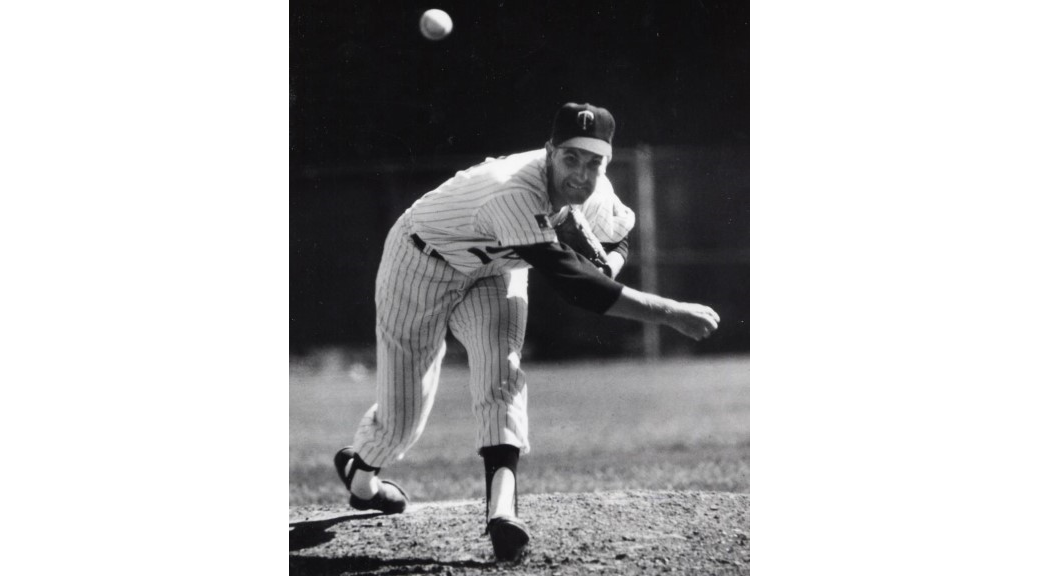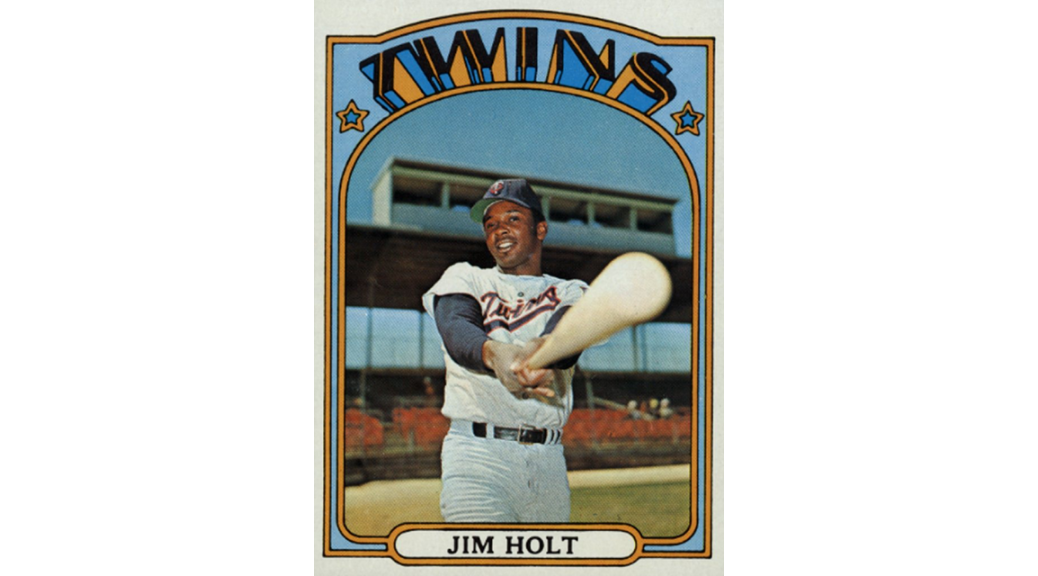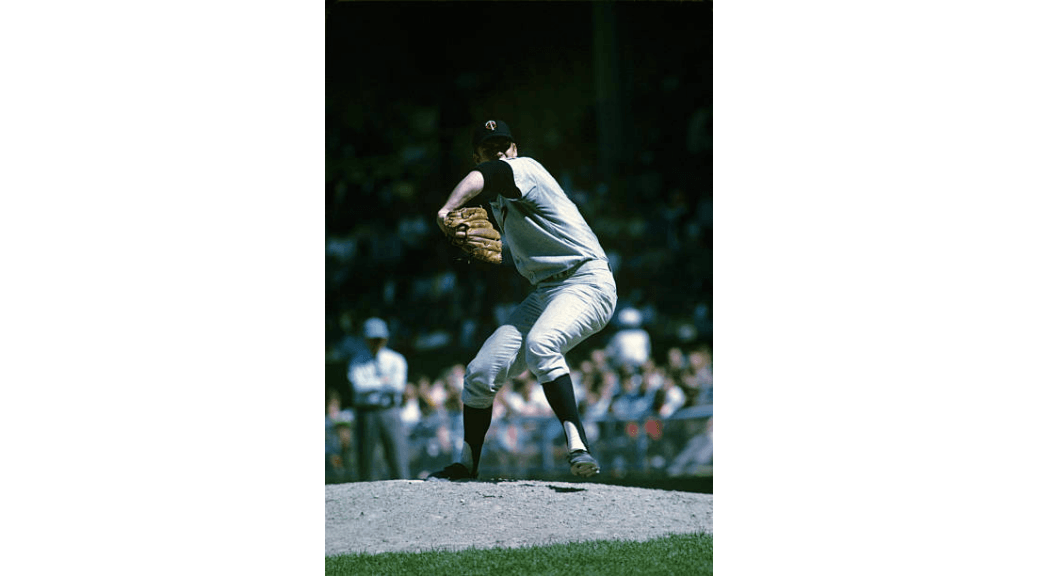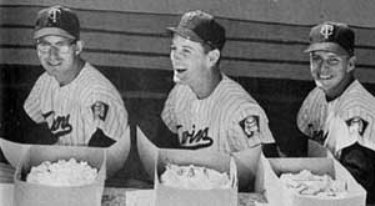MINNESOTA 8, CHICAGO 4 IN MINNESOTA (FIRST GAME OF DOUBLEHEADER)
Date: Sunday, June 10.
Batting stars: Rich Rollins was 3-for-3 with a home run (his ninth), a walk, and three runs. Don Mincher was 1-for-3 with a two-run homer (his sixth) and a walk. Harmon Killebrew was 1-for-4 with a two-run homer, his twelfth.
Pitching star: Jim Kaat pitched a complete game, giving up four runs on eight hits and two walks and striking out six.
Opposition stars: Eddie Fisher pitched five innings of relief, giving up one run on one hit and no walks and striking out four. Jim Landis was 3-for-4 with a three-run homer (his eleventh), a double, and two runs. Nellie Fox was 2-for-4 with a triple and a double.
The game: With two out in the first, Landis doubled and Al Smith singled him home to give the White Sox a 1-0 lead. It was the only lead they would have, and it wouldn't last long. In the bottom of the first Rollins singled and Mincher hit a two-run homer to give the Twins a 2-1 lead. In the second, consecutive singles by Earl Battey, Bernie Allen, and Zoilo Versalles loaded the bases, a fourth consecutive single, by Kaat, plated two runs, and a double play scored a third to make the score 5-1 Twins.
Rollins hit a solo homer in the fifth to make it 6-1, and it looked like the Twins had total control of the game behind Kaat. In the eighth, however, Cam Carreon singled, Joe Cunningham walked, and with two out Landis hit a three-run homer to cut the margin to 6-4. But in the bottom of the eighth Rollins walked and Killebrew hit a two-run homer to make it 8-4. Chicago put two runners on in the ninth but did not get the tying run to the plate.
WP: Kaat (5-4). LP: Joel Horlen (5-3). S: None.
Notes: Mincher was at first base in place of Vic Power, who was apparently out with an injury. Other than that, the Twins used their standard 1962 lineup. Bill Tuttle came in for defense in the ninth. He replaced Killebrew, who had been in left, but Tuttle went to center, with Lenny Green moving to left.
Rollins was batting .353. He would finish at .298, which would lead the team. Battey was batting .326. He would finish at .280. The Twins batted .260, which was third in the league. New York led with .267.
Every one of the Twins' eight regulars finished with double digit home runs. Not surprisingly, Killebrew led the team with 48. Bob Allison hit 29, Versalles 17, Power and Rollins 16 each, Green 14, Allen 12, and Battey 11. The Twins hit 185 home runs, again third in the league. Detroit led with 209.
Either Kaat or Camilo Pascual would've been the ace of the staff: both had fine years. Kaat was 18-14, 3.14, 1.18 WHIP; Pascual was 20-11, 3.32, 1.15 WHIP. The third starter, Jack Kralick, was 12-11, 3.85, 1.24. The fourth starter role was split between Dick Stigman and Joe Bonikowski, with Don Lee given a handful of starts as well. Bonikowski, a twenty-one year old rookie, seems to have gotten most of the starts early in the season, but he went 3-6, 4.82, 1.45 as a starter. He did much better out of the bullpen, going 2-1, 1.57, 1.05. It was his only major league season--he pitched poorly in the minors over the next few years. Stigman got most of the starts late and did better, going 9-3, 3.82, 1.32. The Twins only finished five games behind they Yankees--perhaps, had they moved Stigman into the rotation sooner, they'd have made up those five games.
The Twins had a 3.89 ERA, sixth in the league. Baltimore led at 3.69. The Twins were second in WHIP at 1.29. New York led at 1.28.
The Twins scored their early runs off Horlen, who lasted just two innings and allowed five runs on seven hits while striking out one. Horlen would become a fine pitcher, but he was not yet one in 1962. It was his first full season in the majors, and he went 7-6, 4.89. He would be substantially better in 1963, and he went five seasons, 1964-1968, in which he posted ERAs under three while pitching over 200 innings. In four of those seasons his ERA was less than 2.50. Even in a pitcher's era, that's impressive. Somehow he only made one all-star team and only once got Cy Young consideration. That was in 1967, when he went 19-7, 2.06, 0.95 WHIP. He led the league in ERA, WHIP and shutouts (6), but still lost the award to Jim Lonborg (22-9, 3.16, 1.14 WHIP). Lonborg had a fine season, but had Horlen won a twentieth game it might have made a difference.
We mentioned Eddie Fisher above. There was also, of course, a popular singer of roughly that era named Eddie Fisher, although his career had started to wane by this time. I wonder if a person could come up with a team of ballplayers who had the same name as singers. Michael Jackson comes immediately to mind, but I don't know if there are very many others.
The Twins would sweep the doubleheader. They were in a stretch where they would win five of six, seven of nine, and nine of twelve.
As you may be able to tell, the 1960s era is my favorite era of Twins baseball. I guess it's because they were the team I followed when I was a kid--I think most of us tend to think of the way sports were when we were young as a golden era. 1962 was a little early--I was only three then--but by 1965 I had started to pay attention and by 1969 I was completely hooked.
Record: The Twins were 34-24, in second place in the American League, percentage points behind New York. They would finish 91-71, in second place, five games behind New York.
The White Sox were 29-29, in sixth place in the American League, five games behind New York. They would finish 85-77, in fifth place, 11 games behind New York.
Random Record: The Twins are 45-44 in Random Rewind games.




